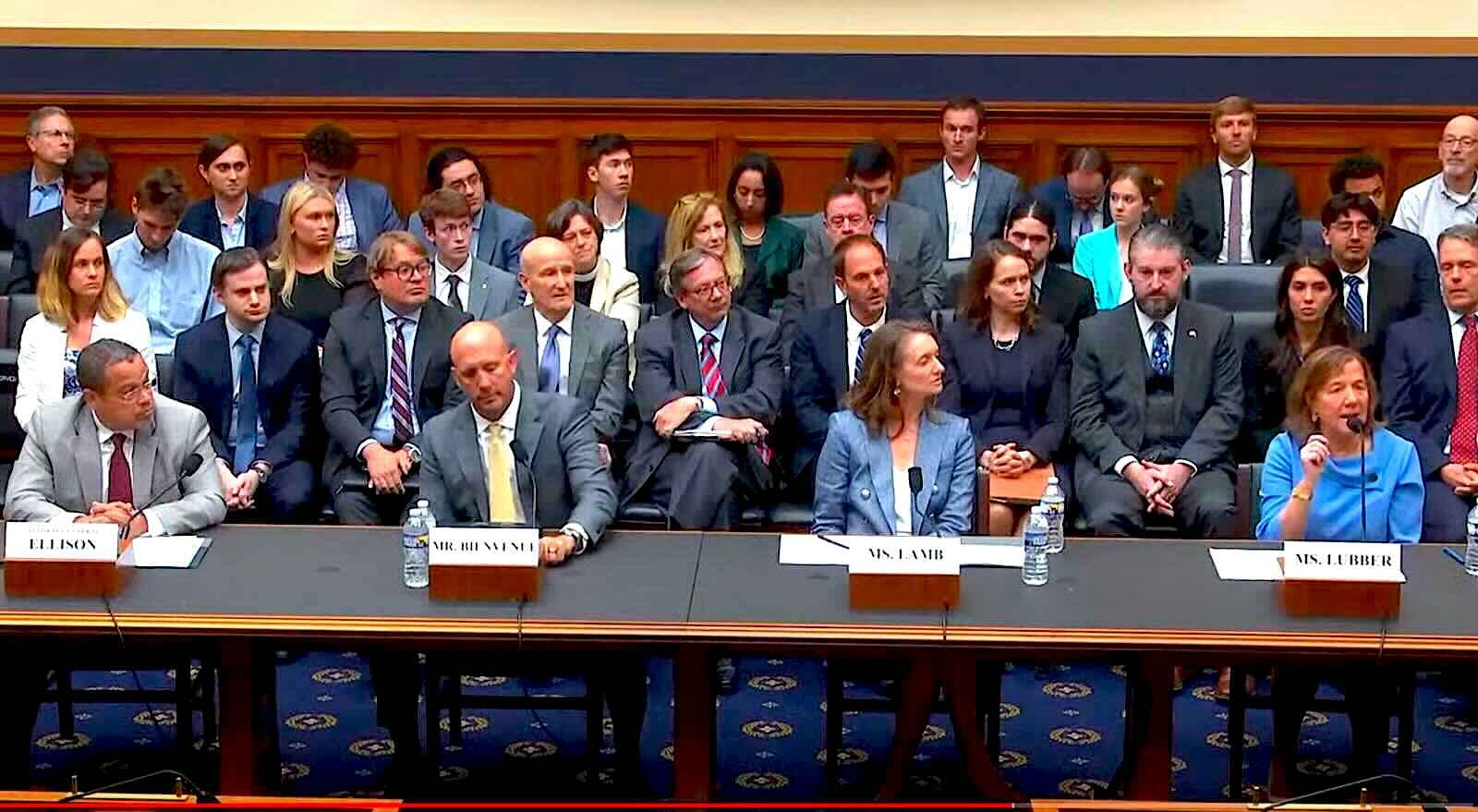TGIF, Agents of Impact!
- Playing to win
- Flipping the Hollywood script
- Outcomes-based funds
🗣 The backlash this time. At 109 and 110 years old, respectively, Lessie Benningfield Randle and Viola Fletcher are the last living links to the 1921 race massacre in Tulsa, and by extension, to the resilient Black local economies that persisted long after the Reconstruction era that followed the US Civil War. When the Oklahoma Supreme Court ruling last week dismissed their claim for reparations, we went back to ImpactAlpha’s 2021 podcast, part of our Reconstruction series, with Tiffany Crutcher, whose great-grandmother survived the Tulsa slaughter and whose twin brother, Terence, was killed by police in 2016. Tulsa isn’t the first, or last place where Black communities and Black wealth have been crushed by organized violence (see also, and listen to, “Lessons from the Wilmington coup of 1898”). That periods of Black wealth building, social progress and multiracial prosperity are met by organized backlashes is a recurring pattern in American history, as film director Ava DuVernay and Ford Foundation’s Roy Swan discussed in our video interview.
And here we are. Tiny grants designed for business founders of color hardly count as reparations, but such programs, including from Atlanta-based Fearless Fund and San Diego-based Founders First, are nonetheless weathering a coordinated assault from a network of conservative legal organizations, as Amy Cortese and I reported. “These lawsuits are part of a continued pattern among opponents of ESG, and more recently DEI, who seek to sow confusion and disrupt the ability of investors to make decisions that are consistent with their fiduciary duty,” Fran Seegull of the US Impact Investing Alliance told us. Investor efforts to engage corporate super-emitters on decarbonization efforts, such as Climate Action 100+, find themselves labeled a “climate cartel” by the Republican majority of the House Judiciary Committee (listen to subcommittee chair Rep. Thomas Massie of Kentucky ably summarize the nefarious playbook on this week’s podcast). Shareholder votes on the G in ESG are apparently more acceptable when they’re in support of outsized executive compensation, like Elon Musk’s $56 billion pay package. Thursday’s vote was also about “how the billionaire class can flex its muscles to protect the ability to continue to amass such fantastic wealth,” Amy wrote (again).
At last week’s gathering of impact investors at the Sorenson Impact Summit in Park City, Utah, the dinner conversation had turned to the need to go on offense. “It’s all about power and control,” said a prominent political strategist, who shall remain unnamed per Chatham House rules. “You have a lot of frickin’ money, right? Say, ‘We are capitalists.’ Say, ‘These people who are trying to control all this stuff, they’re the cronies. They’re the ones who want to reduce market options.’” The event’s organizers appeared anxious about the intrusion of political vibes into a community that has tried to remain bi- or even post-partisan. “It’s okay to throw a punch once in a while,” counseled the consultant. “When some troll comes for you, you will be armed with belief. You will be armed with the facts. You will be armed with history at your back. But you have to get together and say those things and believe that the things that you’re pushing will win out.” – David Bank
Other must-reads on ImpactAlpha this week:
- “Prime Coalition debuts updated CRANE tool to estimate emissions reductions.”
- “In Latin America, investors see economic opportunities through a gender lens.”
- “Raven Indigenous Capital lands backing for its outcomes-based finance fund.”
The Week’s Podcast
🎧 This Week in Impact. Host Brian Walsh takes up ImpactAlpha’s top stories with editor David Bank. Up this week: the backlash to climate action, diversity and ESG continues at congressional antitrust hearings; legal challenges to race-based business grants; shareholder votes at Tesla; and women’s growing economic power in Latin America. Plus, how Ava Duvernay flipped Hollywood’s script on financing for social impact filmmaking.
- Listen to the new episode of This Week in Impact. Get the podcast in your feed by subscribing on Apple or Spotify.
The Week’s Deal Spotlight
How fund managers are rebooting outcomes-based finance. A lot has changed in the 14 years since the first pay-for-success social impact bond. Clunky, time-consuming deals that layer commercial, philanthropic and public capital to level up social impact projects are out. In are “outcomes-based” blended-finance funds that can efficiently usher capital to community-driven initiatives. ImpactAlpha has learned that Canada-based Raven Indigenous Capital Partners reached a $20.4 million first-close for its Indigenous Outcomes Fund. The fund partners with Indigenous communities in the US and Canada on climate and health-focused projects, like renewable energy access and diabetes care. New York-based Maycomb Capital is raising its second Community Outcomes Fund, with a target of $100 million, to provide working capital to organizations contracted by government agencies for early childhood development, workforce development and health equity interventions. Globally-focused funds include OutcomesX’s “outcomes marketplace,” Roots of Impact’s and iGravity’s Impact-Linked Finance Fund, and UBS Optimus Foundation’s and Bridges Outcomes Partnerships’ joint SDG Outcomes Fund.
- Beyond social impact bonds. Early versions of outcomes-based financing were known for their complexity and time-consuming deal structuring. It could take 18 months or more to get term sheets signed for social impact bonds, or SIBs, for recidivism reduction, family services support or housing the homeless. The cumbersome process and mixed success inhibited the scalability of the approach. Social Finance, one of SIBs’ earliest champions and arrangers, adapted the model for a fund focused on workforce upskilling. It’s partnering with the state of Massachusetts on a fund for green workforce development.
- Community-aligned. Communities should be in the drivers’ seat, rather than investors or public agencies, Raven’s Jeff Cyr argues in an article with Dalberg’s Uldall-Poulsen. Outcomes-based finance “offers an opportunity to ensure that the programs reflect the cultural practices and values that shape individual behavior.” (See also, “Mobilizing capital in Indian Country.”) In Raven’s fund, which uses the familiar LP/GP structure, communities choose the issues to address, suitable interventions and outcome targets. Raven sets up what it calls a community-driven outcomes contract and funds two- to three-year interventions. Raven’s fund gets repaid by governmental “off-takers” based on successful outcomes, such as dietary changes for diabetes patients.
- Investing in health. Both Raven and Maycomb are targeting community-led health initiatives, a theme in outcome-based finance because of their positive effects on community and economic well being. The first deal on OutcomesX, a “marketplace” that allows organizations to sell guarantees of their projects’ success to philanthropic backers and investors, focuses on the mental health of Ukrainian children. Brookings Institution is hosting a discussion on outcomes-based financing for global health on Tuesday, June 18.
- Go with the dealflow. Share this post and check out the full roundup of ImpactAlpha’s deal reporting this week.
The Week’s Talent and Jobs
💼 See and share more than a dozen new impact jobs posted this week on ImpactAlpha’s Career Hub and view hundreds of more jobs in impact investing and sustainable finance. Have a job listing to post? Submit it here.
Jennifer Houle, previously with Coeuraj, joined Raven Indigenous Capital Partners as director of people and culture… UBS named Jiayun Fang, formerly of United Overseas Bank, Southeast Asia social impact lead… Lissy Smit stepped down as CEO of Aqua-Spark. She will be succeeded by Mike Velings, who co-founded the fund with Amy Novogratz.
Geovanni Pérez, previously with Red Nacional de Grupos Gestores (Spanish for National Network of Management Groups), joined Alterna as a business development officer… The Coalition for Green Capital appointed Purdue University’s Mung Chiang to its board of directors… Madhu Gupta, previously an MBA intern at Amazon, joined Acumen America as a senior associate.
Local Initiatives Support Corporation, or LISC, appointed Sam Ruark, previously with Green Built Alliance, as director of Equitable Green Initiatives, LISC’s national green development program… The Rockefeller Foundation named James Irungu Mwangi of Africa Climate Ventures, World Resources Institute’s Ani Dasgupta, Bank of America’s Karen Fang, and Arunabha Ghosh of the Council on Energy, Environment and Water, among others, to a new Climate Advisory Council.
That’s a wrap. Have a wonderful weekend.
– June 14, 2024











